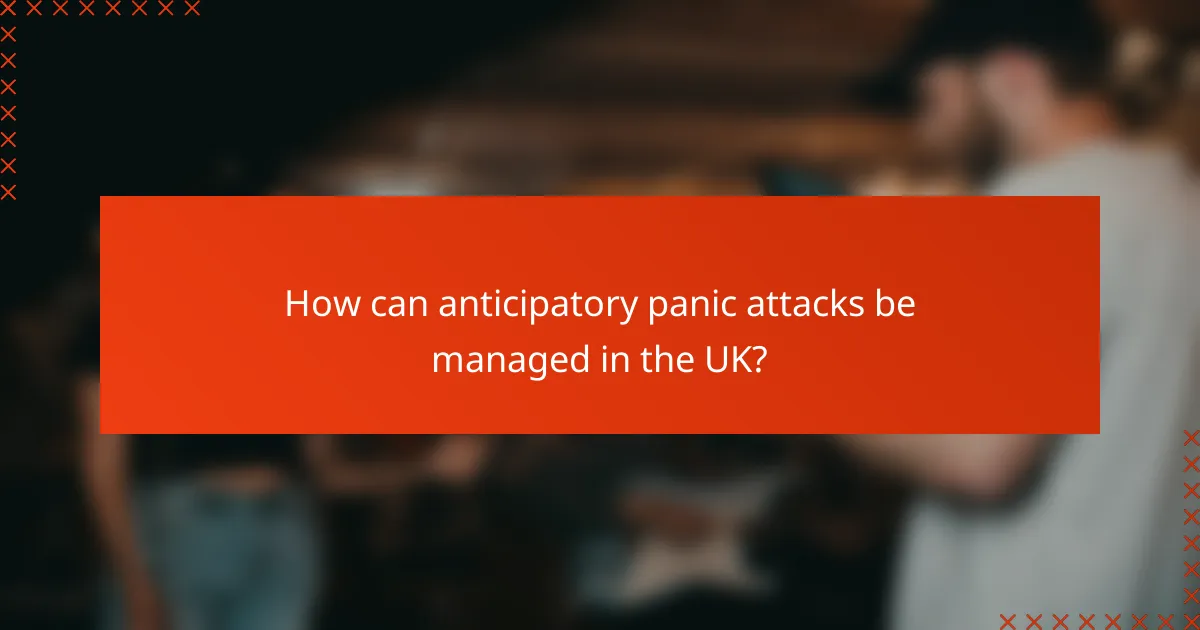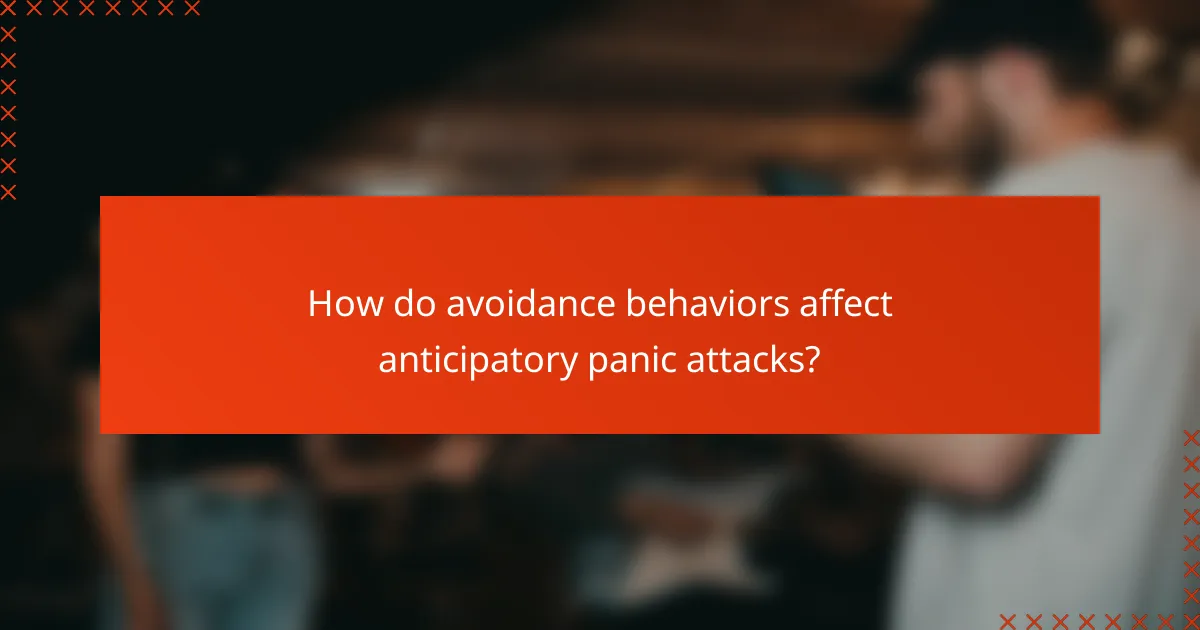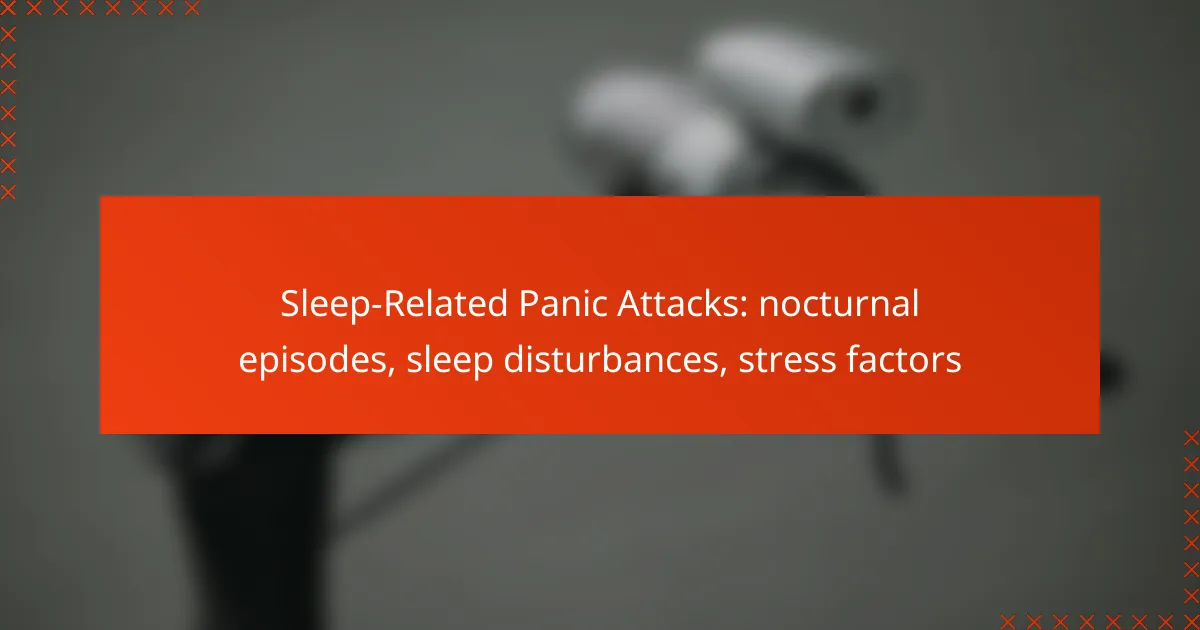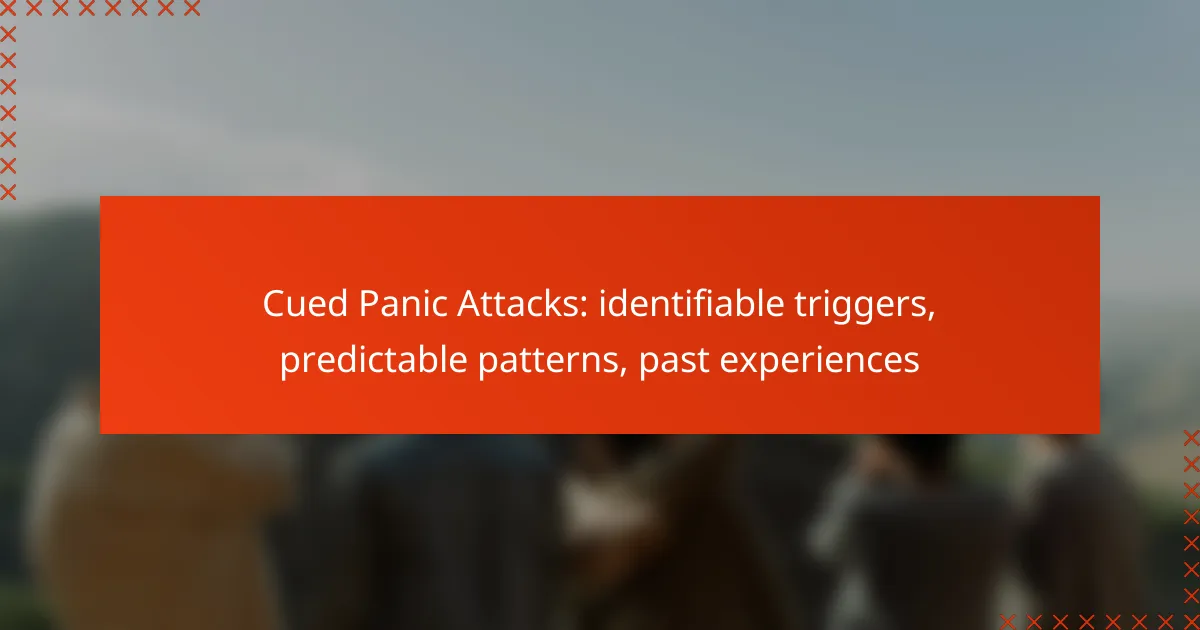Anticipatory panic attacks involve an intense fear of experiencing future panic episodes, often resulting in physical and psychological symptoms. This heightened anxiety can lead to avoidance behaviors and increased vigilance as individuals attempt to navigate their daily lives while managing the looming threat of another attack.

How can anticipatory panic attacks be managed in the UK?
Anticipatory panic attacks can be effectively managed through various therapeutic approaches, including Cognitive Behavioral Therapy (CBT), mindfulness techniques, medication, and support groups. These strategies help individuals address their fears, reduce avoidance behaviors, and improve overall coping mechanisms.
Cognitive Behavioral Therapy (CBT)
CBT is a widely used therapy that focuses on changing negative thought patterns and behaviors associated with anticipatory panic attacks. It helps individuals identify triggers and develop coping strategies to manage anxiety effectively.
In the UK, CBT is often available through the National Health Service (NHS) or private practitioners. Sessions typically involve structured exercises and homework assignments to reinforce learning and progress.
Mindfulness Techniques
Mindfulness techniques encourage individuals to stay present and observe their thoughts and feelings without judgment. Practices such as meditation, deep breathing, and body scans can reduce anxiety and help manage anticipatory panic attacks.
Incorporating mindfulness into daily routines can be beneficial. For example, setting aside a few minutes each day for mindful breathing can help build resilience against future panic attacks.
Medication Options
Medication can be an effective option for managing anticipatory panic attacks, particularly when symptoms are severe. Common medications include selective serotonin reuptake inhibitors (SSRIs) and benzodiazepines, which can help alleviate anxiety.
Consulting with a healthcare professional is essential to determine the most suitable medication and dosage. Regular follow-ups can help monitor effectiveness and adjust treatment as needed.
Support Groups
Support groups provide a platform for individuals experiencing anticipatory panic attacks to share their experiences and coping strategies. These groups can foster a sense of community and reduce feelings of isolation.
In the UK, various organizations offer support groups, both in-person and online. Participating in these groups can enhance emotional support and provide practical tips for managing anxiety.

What causes anticipatory panic attacks?
Anticipatory panic attacks are primarily caused by the fear of experiencing future panic attacks, leading to heightened anxiety and avoidance behaviors. This cycle can be influenced by previous experiences, genetic factors, and environmental stressors.
Previous Panic Attack Experiences
Experiencing a panic attack can create a lasting impact, leading individuals to fear the possibility of future attacks. This fear often results in avoidance behaviors, such as steering clear of places or situations where previous attacks occurred. Over time, this can limit daily activities and increase overall anxiety.
Genetic Predisposition
Genetic factors can play a significant role in the likelihood of developing anticipatory panic attacks. Individuals with a family history of anxiety disorders may be more susceptible to experiencing panic attacks themselves. Understanding this predisposition can help individuals recognize their vulnerability and seek appropriate support.
Environmental Stressors
Environmental stressors, such as major life changes, trauma, or chronic stress, can trigger anticipatory panic attacks. Situations like job loss, relationship issues, or significant health concerns can heighten anxiety levels. Identifying and managing these stressors is crucial for reducing the frequency and intensity of panic attacks.

What are the symptoms of anticipatory panic attacks?
Anticipatory panic attacks are characterized by a heightened fear of experiencing future panic attacks, leading to various physical and psychological symptoms. Individuals may exhibit avoidance behaviors and increased vigilance as they try to manage their anxiety about potential attacks.
Increased Heart Rate
One common symptom of anticipatory panic attacks is an increased heart rate, often felt as a racing or pounding heartbeat. This physiological response can occur even in the absence of a panic attack, as the body prepares for perceived threats.
To manage this symptom, practice deep breathing techniques or mindfulness exercises. These methods can help calm the nervous system and reduce heart rate during moments of anxiety.
Shortness of Breath
Shortness of breath is another frequent symptom associated with anticipatory panic attacks. This sensation can be distressing and may lead individuals to fear they are suffocating or having a heart attack.
Engaging in controlled breathing exercises can alleviate this symptom. Focus on inhaling deeply through the nose and exhaling slowly through the mouth to regain a sense of control over your breathing.
Excessive Worry
Excessive worry about potential panic attacks is a hallmark of anticipatory panic attacks. This constant state of anxiety can lead to avoidance behaviors, such as steering clear of places or situations where attacks have previously occurred.
To combat excessive worry, consider keeping a journal to track your thoughts and feelings. This practice can help identify triggers and patterns, allowing for better management of anxiety and a gradual approach to facing feared situations.

How do avoidance behaviors affect anticipatory panic attacks?
Avoidance behaviors can significantly exacerbate anticipatory panic attacks by reinforcing the fear of future episodes. When individuals avoid situations or places they associate with panic, they may feel temporary relief, but this often leads to increased anxiety and a cycle of avoidance that can worsen overall panic symptoms.
Increased Anxiety Levels
Avoidance behaviors contribute to heightened anxiety levels as individuals become more preoccupied with the possibility of experiencing a panic attack. This constant vigilance can create a feedback loop, where the fear of an attack leads to more avoidance, which in turn increases anxiety about future attacks. Over time, this can result in a generalized anxiety disorder if left unaddressed.
For example, someone who avoids crowded places due to fear of a panic attack may find themselves feeling anxious even in safe environments, as they become hyper-aware of their surroundings and potential triggers.
Impact on Daily Life
The impact of avoidance behaviors on daily life can be profound, limiting personal and professional opportunities. Individuals may miss out on social events, work functions, or even routine errands, leading to feelings of isolation and frustration. This can affect relationships and job performance, creating additional stress and anxiety.
To mitigate these effects, it is crucial to gradually confront feared situations rather than avoid them. This approach, known as exposure therapy, can help reduce anxiety over time and improve overall quality of life by breaking the cycle of avoidance.

What role does increased vigilance play?
Increased vigilance is a critical factor for individuals experiencing anticipatory panic attacks, as it heightens awareness of potential triggers and can lead to avoidance behaviors. This heightened state of alertness can create a cycle of anxiety, where the fear of future attacks becomes a constant presence in daily life.
Heightened Awareness of Triggers
Heightened awareness of triggers means individuals become more sensitive to situations or stimuli that may provoke anxiety. This can include crowded places, specific social interactions, or even certain physical sensations like a racing heart. As a result, individuals may start to avoid these triggers, which can limit their daily activities and social engagements.
For example, someone who has experienced panic attacks in a shopping mall might become overly cautious in similar environments, leading to a pattern of avoidance that reinforces their anxiety. Recognizing these triggers is essential for developing coping strategies.
Potential for Overreaction
Increased vigilance can lead to overreaction to perceived threats, where individuals misinterpret benign situations as dangerous. This can escalate anxiety levels and may result in panic attacks even in the absence of real danger. The mind may amplify normal stress responses, making it difficult to distinguish between a genuine threat and a false alarm.
For instance, if a person feels slightly dizzy, they might immediately assume they are about to have a panic attack, prompting a cycle of fear and anxiety. To counteract this, practicing mindfulness and grounding techniques can help individuals manage their reactions and reduce the likelihood of overreacting to non-threatening situations.



